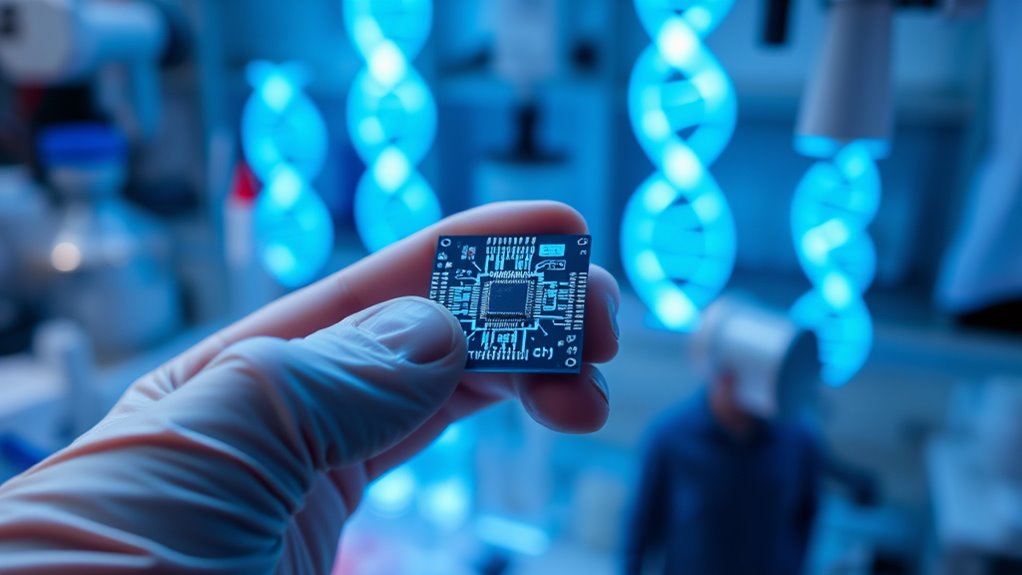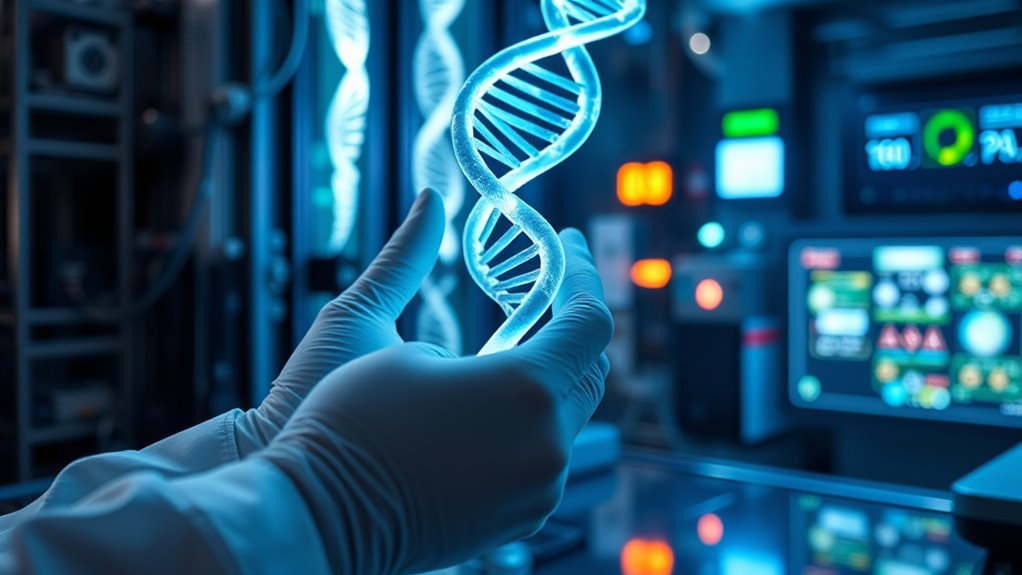CRISPR medicines allow you to target and edit specific DNA sequences, offering new hope for treating genetic disorders and certain diseases. While the potential is huge, ensuring safety is essential, especially to prevent unintended changes or off-target effects. Responsible use depends on strict protocols, transparency, and ongoing ethical discussions. If you want to understand how scientists are working to make gene editing more precise and safe, there’s much more to explore.
Key Takeaways
- CRISPR medicines use precise gene editing to target and correct faulty DNA sequences responsible for genetic diseases.
- Editing chemistry involves designing guide RNAs and Cas proteins to accurately identify and modify specific genetic locations.
- Safety concerns include off-target effects, unintended mutations, and long-term impacts on human health and future generations.
- Strict safety protocols, transparency, and informed consent are essential to ensure responsible application of CRISPR-based therapies.
- Advances in AI and molecular techniques are improving the precision, efficacy, and safety of CRISPR medicines.

Have you ever wondered how scientists are revolutionizing medicine? With advancements like CRISPR technology, the way we approach treatments for genetic diseases is changing dramatically. At the heart of this innovation is gene therapy, a technique that involves editing or replacing faulty genes to cure or prevent illnesses. CRISPR, short for Clustered Regularly Interspaced Short Palindromic Repeats, allows you to precisely target specific sections of DNA, making gene therapy faster, more accurate, and potentially more effective. Instead of relying on traditional drugs that manage symptoms, CRISPR enables you to directly correct genetic mutations at their source. This breakthrough offers hope for conditions once deemed untreatable, like certain inherited disorders, some cancers, and even viral infections.
However, with this powerful tool come serious ethical considerations. As you explore gene editing, questions about safety, consent, and long-term impacts arise. For instance, editing the human germline means changes are passed on to future generations, raising concerns about unintended consequences or unforeseen mutations. You need to consider whether it’s right to alter human DNA, especially for non-therapeutic enhancements. The potential for “designer babies” sparks debates about societal inequality, eugenics, and the moral boundaries of scientific intervention. These ethical considerations aren’t just theoretical—they influence regulations and public opinion, shaping the future of CRISPR medicine.
Exploring gene editing raises ethical questions about safety, consent, and societal impacts like designer babies.
Balancing the promise of gene therapy with ethical responsibilities is essential. You must guarantee that research adheres to strict safety protocols, minimizing risks of off-target effects—where CRISPR might cut DNA unintentionally, leading to new mutations. Transparency and informed consent are indispensable, especially when testing these therapies in humans. Public trust depends on clear communication about both the benefits and risks involved. As scientists develop CRISPR-based treatments, they’re also establishing guidelines to govern responsible use, ensuring that ethical considerations stay at the forefront of innovation. Additionally, advances in related fields like AI in healthcare are helping to improve the safety and precision of gene editing techniques.
In this rapidly evolving landscape, you’re part of a broader conversation about how society should handle these groundbreaking capabilities. CRISPR offers unprecedented opportunities to cure diseases and improve lives, but it also demands careful ethical reflection. By understanding the significance of gene therapy and the importance of ethical considerations, you can appreciate both the potential and the responsibility that comes with wielding such a powerful tool. As research continues, your awareness and engagement will be essential in shaping a future where medicine advances safely, ethically, and for the benefit of all.
Frequently Asked Questions
How Long Does It Take for CRISPR Medicines to Show Effects?
The treatment timeline for CRISPR medicines varies, but you might see effects within weeks to months. The effect onset depends on the condition being treated and how quickly the gene editing works in your body. Some responses could be immediate, especially if the therapy targets blood cells, while others may take longer as the edited cells proliferate. Your healthcare provider will give you a clearer idea based on your specific treatment plan.
Are There Long-Term Safety Studies on CRISPR Therapies?
Sure, there are some long-term safety studies on CRISPR therapies, but don’t hold your breath. Clinical trials are ongoing, and scientists are closely watching for any unexpected effects down the line. While early results look promising, the full picture of long-term safety remains a work in progress. So, if you’re betting on CRISPR for lifelong health, remember—science is still writing that chapter.
Can CRISPR Be Used to Treat Complex, Multi-Gene Diseases?
Yes, you can use CRISPR to treat complex, multi-gene diseases, but it’s still challenging due to multi-gene challenges. Researchers are working on developing personalized therapies that target multiple genes simultaneously, which could improve treatment effectiveness. While promising, these approaches require precise editing and extensive testing to guarantee safety and efficacy. As science advances, CRISPR’s potential to address complex diseases becomes more feasible, offering hope for tailored, multi-gene solutions.
What Are the Costs Associated With Crispr-Based Treatments?
Like steering through a maze, the costs of CRISPR treatments can be complex. You might face pricing hurdles, with treatments costing hundreds of thousands to over a million dollars. Insurance coverage varies, often leaving patients to bear significant expenses. While prices could decrease with technological advances, right now, affordability remains a challenge, making it difficult for many to access these groundbreaking therapies.
How Accessible Are CRISPR Medicines Globally?
You might find CRISPR medicines less accessible globally due to regulatory hurdles and manufacturing challenges. Many countries haven’t yet approved these treatments, delaying their availability. Additionally, producing CRISPR therapies requires complex, costly manufacturing processes that limit widespread distribution. While some regions see rapid adoption, others face significant barriers, making it difficult for you to access these innovative treatments everywhere. Progress depends on overcoming these hurdles to guarantee broader, equitable access worldwide.
Conclusion
While some worry about the safety of CRISPR medicines, remember that ongoing research constantly improves these techniques to minimize risks. It’s natural to be cautious about new technology, but with rigorous testing and regulation, CRISPR has the potential to revolutionize medicine and save countless lives. Don’t let fear hold you back from embracing the possibilities—this cutting-edge science is shaping a healthier future for everyone.









